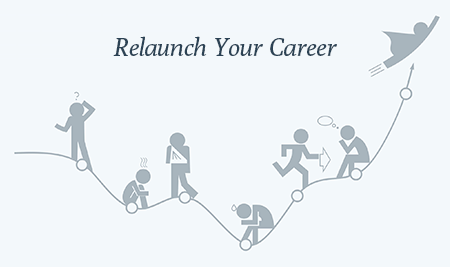Still, you continue to return to work each and every day.
You keep going through the motions even though deep down, you’re absolutely certain you can’t keep going on like this. In fact, you’re so unhappy that you’ve been thinking about resigning. For quite some time now. Come to think of it, around this time last year, a similar thought entered your mind. Now, a year later, things haven’t really gotten much better, but you just haven’t been able to bring yourself to pull the plug.
I’ve been there. In 2012, I was nine years into my career as a brand marketer at a consumer goods company in London, steadily climbing the corporate ladder. I had recently gotten married, and something about that life change exacerbated the lack of fulfillment I had been feeling in the corporate world for quite some time.
It reminded me of how I felt many years prior when I was on a path toward becoming a medical doctor. For many years, I went through through the motions of becoming a doctor, but throughout that process, I wasn’t truly excited by the prospect of becoming a physician. I found the content mind-numbing. I didn’t feel like I was making the most of who I was. And I didn’t feel energized by my work, something I spoke about in my TEDx Talk. I eventually left my medical career behind to pursue marketing. Many years later, I eventually left my marketing job behind to pursue career consulting—my current line of work.
Even during those times when I was feeling unhappy with my situation, I found myself struggling to move on.
 Sounds strange doesn’t it? You figure if you’re not happy with your situation, you just get yourself out of that situation, right?
Sounds strange doesn’t it? You figure if you’re not happy with your situation, you just get yourself out of that situation, right?
Easier said than done.
Why is it so hard to move on, even when you know the situation you’re in is wrong for you?
Making the decision to leave your job or career behind is huge. A lot is at stake. Education, investment, money, status, reputation, future job prospects. The list goes on. Moving on is tough. It’s complicated.
Due to my current focus on working with people trying to relaunch their careers, I often cross pass with professionals standing on the edge of change. That intersection between where they have been, and where they want to take their careers. One of the most confusing intersections you’ll face in your career.
So how do you clarify if the time has finally come to resign? I found that asking yourself three questions can provide you with some clarity when standing on the confusing cusp of change:
How is staying in your job serving you?

If you’re in a job that makes you unhappy, and your wondering why you’re still there after all this time, it’s likely because that job is serving you in some way. Maybe this seems obvious. But for me, acknowledging and admitting specifically how my career path was serving me has helped me clarify if and when I want to let that go.
For example, I was hanging on to my corporate marketing job that left me feeling unfulfilled and depleted at the end of each day, I realized many of my reasons for staying were due to external factors. Like keeping up with my peer group, a sort of social, professional “status” for lack of a better term. When I continually received LinkedIn updates about this former classmate or that former colleague getting promoted to Director, Vice President, or insert Fancy Title here at Goldman Sachs, McKinsey, Proctor & Gamble, or insert Big Name Fortune 500 Company here, the idea of leaving behind my reputable title working on a cool brand at a well-known company definitely dealt a blow to my social ego.
What is staying in your job costing you?

One of the things you learn very quickly your career is that everything comes with a cost. I mean everything. There’s always an opportunity cost. Always. While your job is serving you in someway, it’s also costing you something else. And getting clear on those costs is important so you can determine whether the time has come to now prioritize those things you’ve been giving up.
To give you an example, for many years that go all the way back to my college days when I majored in psychology, I had a very deep desire to focus my life on helping people. This initially manifested in my desire to become a doctor. Later, when I pursued my MBA instead, I had initially thought to become a professional business coach. However, many people older and wiser than I advised me to table the idea and first spend time working in the corporate world to gain an understanding of the context and working environment of those very individuals I would one day coach.
While this had been good advice, and the investment of time was worth it, it became clear to me that working as a marketer in the corporate world at least temporarily cost me doing work I found truly meaningful.
Is this trade-off still worth it?

Trade-offs are inevitable in our careers. We may prioritize certain factors that serve us well during certain life stages that become less relevant during others. We may postpone pursuing our true passions to first gain other important experiences. And we might make choices during certain points in our careers that eventually make less sense during other times.
The good news is, you always have a choice.
At some point, you have to ask yourself if this trade-off you’ve been making is still worth it. What is the relative importance of what you’re gaining versus what you’re giving up? And how has this changed over time?
For me, I had to rank the relative importance between hanging onto a career I knew look good on paper versus feeding my desire to do meaningful work I truly cared about. In terms of relative importance, although at one point in my life, external perceptions of my professional credibility might have been higher, I reached a point where my personal fulfilment just mattered more.
Once I became clear on this, I made the leap.
It didn’t make the leap any less scary or complicated, but at least I knew why I was doing it. And being clear on my motivation for change, has helped me stay on track during the inevitable ups and downs of the transition that followed.
Feel free to watch this video below where I explain these 3 clarifying questions in more detail and share a bit more about my own career story.
Is it still worth it to you?
If you been standing on the brink of change, and you’re feeling confused about what to do next, I encourage you to hone in on the #1 thing that keeps you in your job and the #1 thing this is costing you. If you’re the analytical type, give it a rating from 1 (not at all important) to 10 (very important).
You can download my “Should I Stay or Leave” Worksheet to help you go through this exercise of doing a cost benefit analysis of whether you should stay or leave your current job behind. I wish you the best in finding clarify and navigating this important decision.




Great career advice as always, Joseph is an authority on career advice.
Thanks so much
Happy to hear you found this useful!